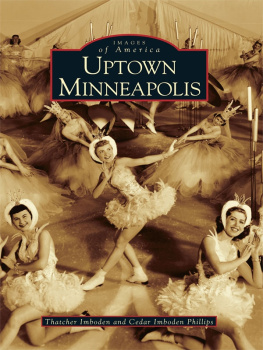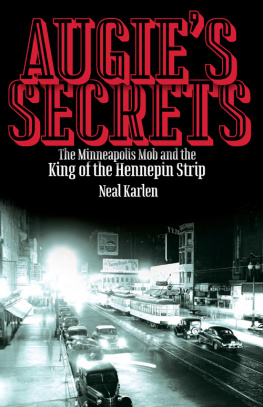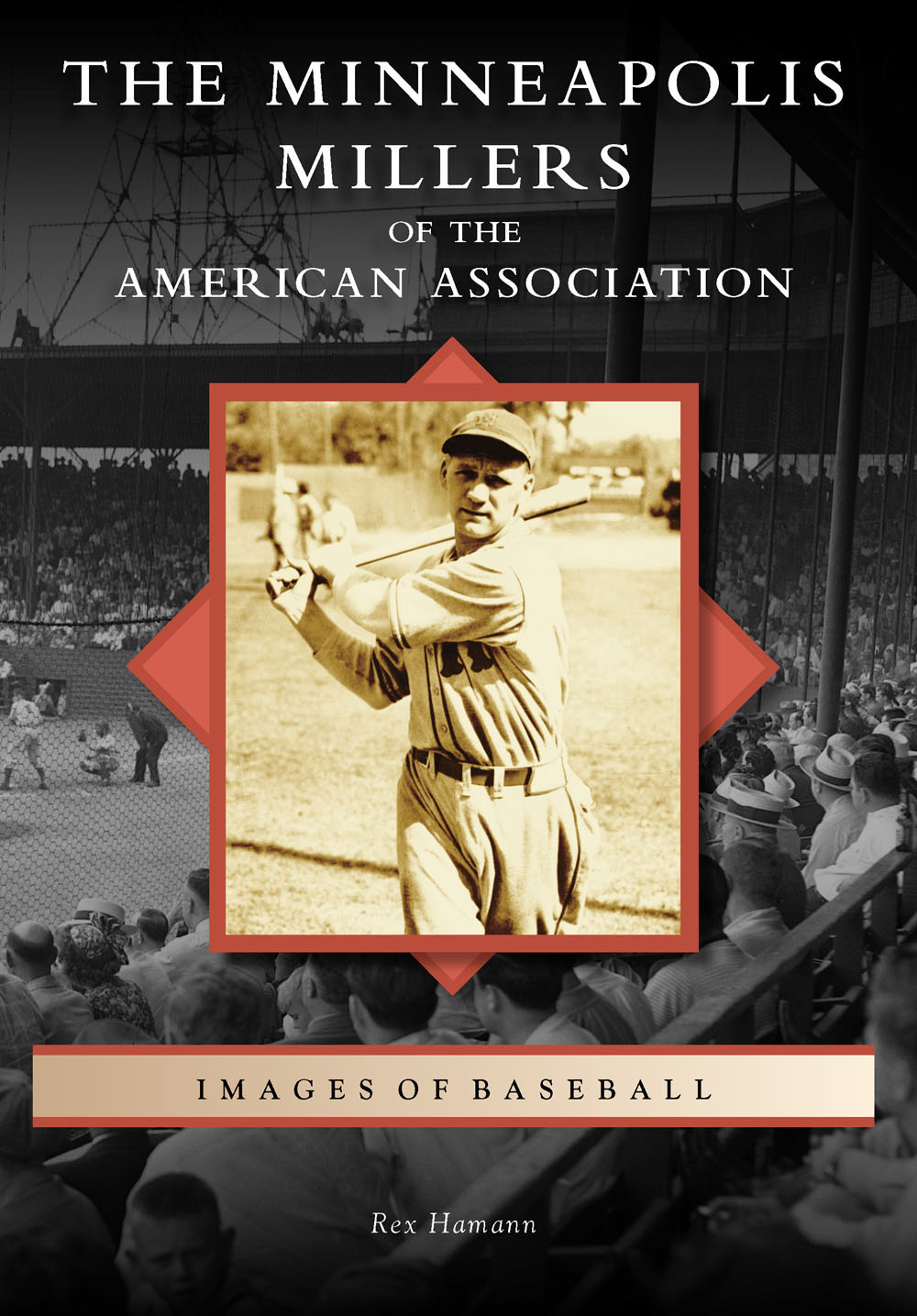
THE
MINNEAPOLIS
MILLERS
OF THE
AMERICAN ASSOCIATION
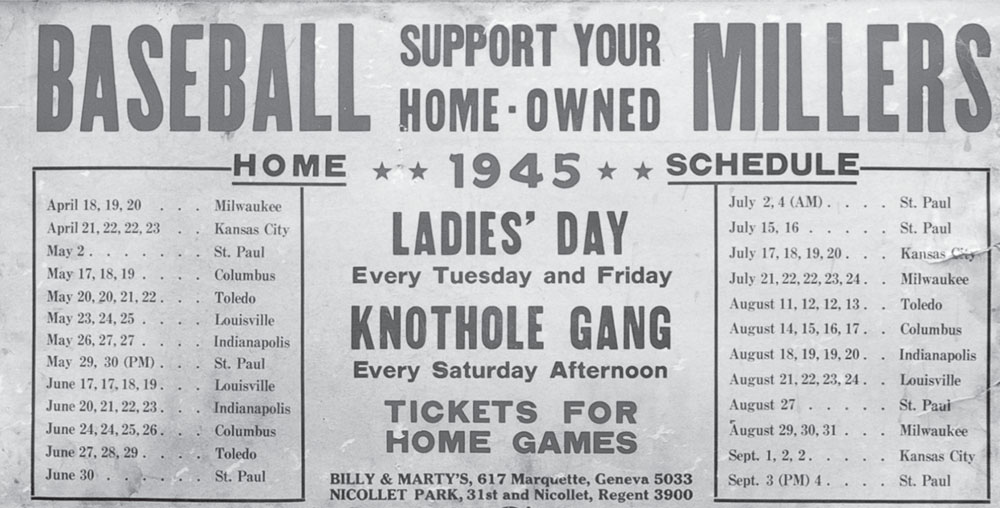
1945 HOME SCHEDULE. This two-color display piece, which runs two feet from side to side, describes the Millers as your home-owned club. As the major leagues continued to develop their farm systems, fewer clubs could make this claim. Many Greatest Generation fans remember buying Millers tickets at Billy and Martys, as well as participating in the Knot Hole program sponsored by the ball club. Gone are the days when teams would play a five-game series, as the Millers did against the Milwaukee Brewers from July 21 to 24. (Authors collection.)
FRONT COVER: Known by fans as Unser Choe (Our Joe in German), Joe Hauser (19321936) was one of the most prolific sluggers in league history. For more information, please see . (Authors collection.)
COVER BACKGROUND: This view of the interior of Nicollet Park was taken sometime around 1945, the beginning of the greatest attendance surge in the parks history. For more information, please see . (Courtesy the Minnesota Historical Society.)
BACK COVER: Long a fixture at Thirty-first Street and Nicollet Avenue on the south side of Minneapolis, Nicollet Parks Tudor-style ticket office was the primary portal for Millers fans seeking access to their beloved boys of summer. For more information, please see . (Authors collection; gift from Don Palmer.)
THE
MINNEAPOLIS
MILLERS
OF THE
AMERICAN ASSOCIATION

Rex Hamann

Copyright 2015 by Rex Hamann
ISBN 978-1-4671-1347-2
Ebook ISBN 9781439650639
Published by Arcadia Publishing
Charleston, South Carolina
Library of Congress Control Number: 2015930412
For all general information, please contact Arcadia Publishing:
Telephone 843-853-2070
Fax 843-853-0044
E-mail
For customer service and orders:
Toll-Free 1-888-313-2665
Visit us on the Internet at www.arcadiapublishing.com
This book is dedicated to the memory of my father-in-law, Dr. Keith E. Lucas, the old Missourian and St. Louis baseball fan whose enthusiastic and unflagging support of my baseball writing inspired this work. With Keiths passing to the Great Majority on April 13, 2014, baseball lost a great fan, and the world lost a great man.
CONTENTS
ACKNOWLEDGMENTS
The staff at the Hennepin County Library Special Collections granted me their assistance in a variety of ways. In particular, I wish to acknowledge the support I received from Bailey Diers and Gail Wolfson. In addition, my wife, Keitha, was a valued and reliable partner in this endeavor.
INTRODUCTION
Imagine strolling through the woods on a sunny day without a care in the worldlooking for nothing, simply open to the possibilities of naturewhen suddenly, dangling from a tree branch, a big, brown envelope seems to emerge from the sky. You look at it in amazementsuch an unexpected event in so quiet a placeand decide to open it. Inside, you find a treasure trove of vintage family photographs. Nothing can describe how you feel about this serendipitous discovery, but you decide you must share it with the world. Such is how I felt after I came upon the wonderful collection of Minneapolis Millers photographs at the Hennepin County Library, located in downtown Minneapolis, in the summer of 2013.
In this, my second book for Arcadia (I completed a volume on the American Association Milwaukee Brewers in 2004), I have brought many examples from this expansive array to the public eye. Perhaps the most difficult part of the project was the process of selection. In the Milwaukee book, we were dealing with a small, private collection. In this one, the number of photographs could have been double that which made it to the book you now have in your hands. After many hours of making scans, I have attempted to make the selections according to player prominence and artistic quality in order to bring forth the best possible examples. Many of the unpublished photographs will be posted on my American Association website (www.almanacfield.com).
I grew up in a family that more or less supported my incessant need to surround myself with baseball. After my teaching career came to a close some 15 years ago, I dedicated myself to researching and writing about baseball history. Growing up in Madison, Wisconsin, my interests revolved around regional teams, including the old Milwaukee Brewers, and from there my passion in the American Association as a whole slowly grew. I have developed a considerable degree of knowledge with respect to the Association, including the Minneapolis Millers and St. Paul Saints (whose rivalry I describe in a book recently published by McFarland: The Millers and the Saints: Baseball Championships of the Twin Cities Rivals). In describing these select photographs, I have made every effort to present things in a way that will inspire curiosity. Through these pages, the reader is invited to look back upon the past with a sense of wonder toward the game of baseball as it was.
Please observe the dates (in parentheses) following the name of each player in the caption titles; these indicate the years spent as an active player with the Minneapolis Millers.
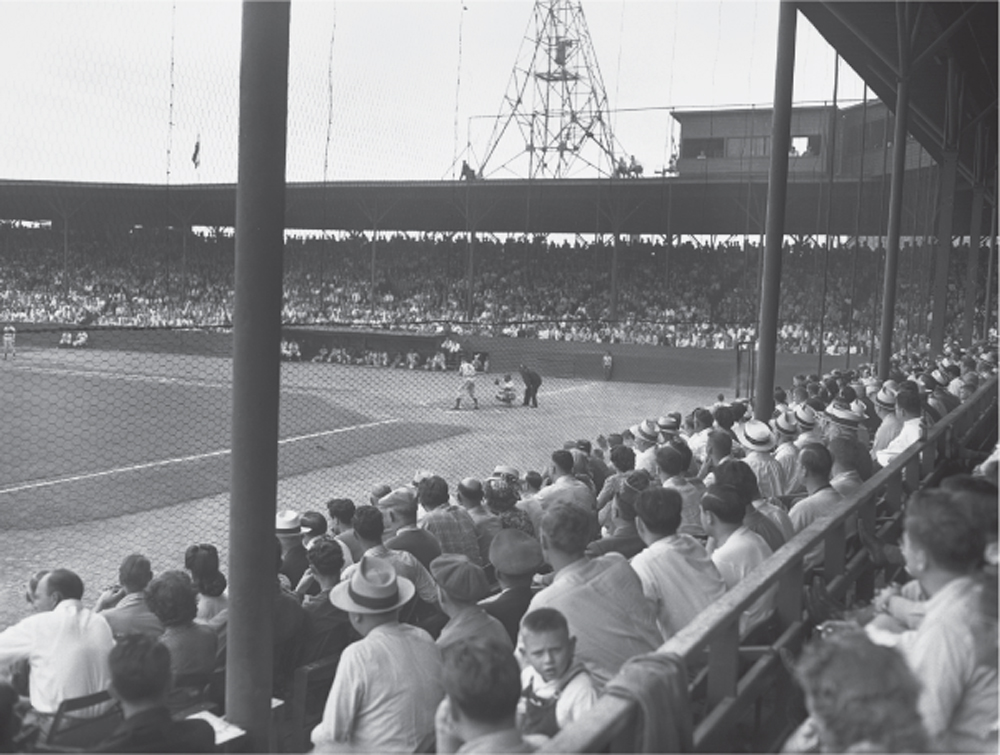
INSIDE NICOLLET PARK. The photographer of this c. 1945 image sat, accompanied by the murmur of the crowd, in the third-base grandstand, aiming the camera lens in the direction of home plate. Originally built in 1896, Nicollet Park sported an all-wooden grandstand, a parking area beneath the facility, and the shortest right-field line in the league. For many years, it was believed that the distance from home plate to the right-field corner was just over 279 feet. However, in 1949, a reporter for the St. Paul Pioneer Press determined it was actually 258 feet. To center field, the distance was a healthy 435 feet, and down the line in left it was 336 feet. The stands had a capacity of 10,000. The best five-season attendance total, 232,152, came right after World War II between 1945 and 1949. The first American Association game at Nicollet Park was played on Saturday, May 10, 1902, against the Louisville Colonels. The Millers struck first with four runs in the first inning, going on to win 9-4. Manager and right fielder Walter Wilmot had three hits in four at-bats, and Fred Luther was the winning pitcher. (Courtesy the Minnesota Historical Society.)
DEADBALL-ERA MILLERS
19021920
In 1902, the American Association formed in part as a response to the introduction of the American League in 1901. Minneapolis was one of eight clubs that belonged to the American Association, and the Millers were joined by their neighboring St. Paul Saints, the Milwaukee Brewers, the Kansas City Blues, the Columbus (Ohio) Senators (later, Red Birds), the Indianapolis Indians, the Louisville Colonels, and the Toledo Mud Hens. These eight teams remained a cohesive circuit for five decades before the reach of major league organizations began to infiltrate Association nests.
The Millers held fast as members of the league, remaining a steady contestant after the departure of the Milwaukee Brewers in 1952 and enjoying some of their best seasons in the twilight of the league. But the early years set things in motion for fans of the Mill City Nine. After a slow start as a league contestant, Minneapolis enjoyed its first solid season during the 1904 campaign under the leadership of William H. Watkins. The following year, the Millers had one of their finest runs of the next two decades, posting a record of 88-62 and finishing in third place. But in 1910, the doors blew off thanks to a magical combination of superb pitching and powerful hitting. It was during that year, the first season under the managerial purview of Pongo Joe Cantillon, that the Millers achieved a club-record 107 wins, losing 61, while running away with the American Association pennant. It was their first of nine first-place finishes during their six-decade stint in the circuit.
Next page


